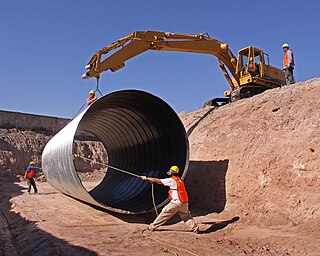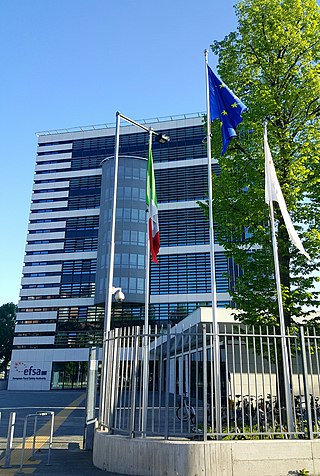Related Research Articles

Workers' compensation or workers' comp is a form of insurance providing wage replacement and medical benefits to employees injured in the course of employment in exchange for mandatory relinquishment of the employee's right to sue his or her employer for the tort of negligence. The trade-off between assured, limited coverage and lack of recourse outside the worker compensation system is known as "the compensation bargain.” One of the problems that the compensation bargain solved is the problem of employers becoming insolvent as a result of high damage awards. The system of collective liability was created to prevent that and thus to ensure security of compensation to the workers.

The Health and Safety Executive (HSE) is a UK public body responsible for the encouragement, regulation and enforcement of workplace health, safety and welfare, and for research into occupational risks in Great Britain. It is a non-departmental public body of the United Kingdom with its headquarters in Bootle, England. In Northern Ireland, these duties lie with the Health and Safety Executive for Northern Ireland. The HSE was created by the Health and Safety at Work etc. Act 1974, and has since absorbed earlier regulatory bodies such as the Factory Inspectorate and the Railway Inspectorate though the Railway Inspectorate was transferred to the Office of Rail and Road in April 2006. The HSE is sponsored by the Department for Work and Pensions. As part of its work, HSE investigates industrial accidents, small and large, including major incidents such as the explosion and fire at Buncefield in 2005. Though it formerly reported to the Health and Safety Commission, on 1 April 2008, the two bodies merged.

Professional diving is underwater diving where the divers are paid for their work. Occupational diving has a similar meaning and applications. The procedures are often regulated by legislation and codes of practice as it is an inherently hazardous occupation and the diver works as a member of a team. Due to the dangerous nature of some professional diving operations, specialized equipment such as an on-site hyperbaric chamber and diver-to-surface communication system is often required by law, and the mode of diving for some applications may be regulated.

The National Institute for Occupational Safety and Health is the United States federal agency responsible for conducting research and making recommendations for the prevention of work-related injury and illness. NIOSH is part of the Centers for Disease Control and Prevention (CDC) within the U.S. Department of Health and Human Services. Despite its name, it is not part of either the National Institutes of Health nor OSHA. Its current director is John Howard.

The Government of Singapore consists of several departments, known as ministries and statutory boards in Singapore. Ministries are led by a member of the Cabinet and deal with state matters that require direct political oversight. The member of the Cabinet heading the ministry is known as the minister, who is supported by a junior minister known as minister of state in Singapore. The administrative management of the ministry is led by a senior civil servant known as permanent secretary.

The European Food Safety Authority (EFSA) is the agency of the European Union (EU) that provides independent scientific advice and communicates on existing and emerging risks associated with the food chain. EFSA was established in February 2002, is based in Parma, Italy, and for 2021 it has a budget of €118.6 million, and a total staff of 542.
Hot work is a process that can be a source of ignition when flammable material is present or can be a fire hazard regardless of the presence of flammable material in the workplace. Common hot work processes involve welding, soldering, cutting, brazing burning and the use of powder-actuated tools or similar fire producing operations outside of designated hot work areas. When flammable materials are not present, industrial processes such as grinding and drilling become cold work processes.
Occupational and Environmental Medicine (OEM), previously called industrial medicine, is a board certified medical specialty under the American Board of Preventative Medicine that specializes in the prevention and treatment of work-related illnesses and injuries.
An environmental health officer (EHO), also referred to as an environmental health practitioner (EHP) or public health inspector, is a person responsible for carrying out measures to protect public health, which includes the administration and enforcement of legislation related to environmental health and safety hazards.

The Atomic Energy Regulatory Board (AERB) was constituted on 15 November 1983 by the President of India by exercising the powers conferred by Section 27 of the Atomic Energy Act, 1962 to carry out certain regulatory and safety functions under the Act. The regulatory authority of AERB is derived from the rules and notifications promulgated under the Atomic Energy Act, 1962 and the Environmental (Protection) Act, 1986. The headquarters is in Mumbai.
The Government agencies of Norway are state controlled organizations that act independently to carry out the policies of the Government of Norway. The Government Ministries are relatively small and merely policy-making organizations, allowed to control agencies by policy decisions but not by direct orders. A Minister is explicitly prohibited from interfering with the day-to-day operation in an agency or the outcome in individual cases. While no minister is allowed to give orders to agencies personally, they are subject to decisions made by the Government. Also, the Minister is normally the instance of appeals of agencies decisions.
An occupational exposure limit is an upper limit on the acceptable concentration of a hazardous substance in workplace air for a particular material or class of materials. It is typically set by competent national authorities and enforced by legislation to protect occupational safety and health. It is an important tool in risk assessment and in the management of activities involving handling of dangerous substances. There are many dangerous substances for which there are no formal occupational exposure limits. In these cases, hazard banding or control banding strategies can be used to ensure safe handling.

The Royal Norwegian Ministry of Labour and Social Inclusion is a Norwegian ministry established in 1846. It is responsible for the labour market, the working environment, pensions, welfare, social security, integration, immigration and asylum. Since 2023 the ministry has been led by Tonje Brenna of the Labour Party.
The government agencies in Iceland are state controlled organisations which act independently to carry out the policies of the Icelandic government.

Occupational safety and health (OSH) or occupational health and safety (OHS) is a multidisciplinary field concerned with the safety, health, and welfare of people at work. OSH is related to the fields of occupational medicine and occupational hygiene and aligns with workplace health promotion initiatives. OSH also protects all the general public who may be affected by the occupational environment.
Permit-to-work (PTW) refers to a management system procedure used to ensure that work is done safely and efficiently. It is used in hazardous industries, such as process and nuclear plants, usually in connection with maintenance work. It involves procedured request, review, authorization, documenting and, most importantly, de-conflicting of tasks to be carried out by front line workers. It ensures affected personnel are aware of the nature of the work and the hazards associated with it, all safety precautions have been put in place before starting the task, and the work has been completed correctly.
Diving regulations are the stipulations of the delegated legislation regarding the practice of underwater diving. They apply within the national territory and territorial waters of a country. In most cases they apply to occupational diving, but in a few cases also to recreational diving. There are exemptions for recreational diving in some cases where it is recognised as a self-regulated industry. Offshore diving is generally outside the scope of diving regulations, and tends to be self-regulated through voluntary membership of industry organisations.

The National Institute for Safety and Health at Work is an autonomous agency of the Government of Spain. The INSST is considered a technical-scientific agency entrusted with the task of analyze and research on safety and health conditions at work, as well of promoting and supporting the improvement of them, in order to achieve a decrease in occupational hazards, work accidents and occupational diseases.
References
- ↑ "Directorate of Occupational Safety and Health Services (DOSHS)". www.labour.go.ke. Retrieved 2017-09-25.